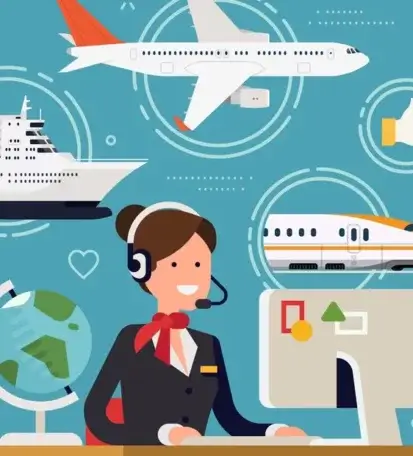Business Travel Guide
The Impact of Business Travel on Corporate Training and Development

In today’s globalized business environment, corporate training and development programs are increasingly influenced by the need for mobility and cross-border collaboration. Business travel, which once primarily focused on networking and client engagement, now plays a significant role in the development of employees’ skills and capabilities.
As companies continue to expand their international presence, business travel becomes essential to ensuring that employees are not only capable of performing their tasks but also able to adapt to various cultural, technological, and business-specific challenges.
The Expanding Role of Business Travel
Business travel has evolved from simple meetings and client presentations to a more complex engagement with global business operations.
In many companies, employees travel to various regions for project-specific training, attending conferences, or leadership development programs.
These trips offer unique opportunities for employees to learn about different markets, understand regional business practices, and improve their cross-cultural communication skills.
Traveling to foreign offices or subsidiaries can immerse employees in the day-to-day operations of the company in a new context.
This immersion enables them to observe and learn new processes, management techniques, and business models that are more effective in certain regions.
Additionally, employees often encounter challenges related to language barriers, local regulations, and market differences, which contribute to a holistic learning experience.
Enhanced Leadership Development
One of the most significant impacts of business travel on corporate training and development is the enhancement of leadership skills. Leadership development programs often include travel as a component, allowing emerging leaders to step outside their comfort zones.
For these employees, international assignments or short-term travels offer valuable exposure to different leadership styles, decision-making processes, and negotiation strategies.
Business travel provides a platform for hands-on learning, where employees can experience managing teams across borders or negotiating with international clients.
These real-life experiences can greatly enhance leadership capabilities, as employees learn to navigate complex situations that they might not encounter in a domestic setting.
Moreover, being physically present in different locations allows leaders to better understand the cultural nuances that affect communication, decision-making, and team dynamics.
Cross-Cultural Training and Adaptation
Corporate training programs that incorporate business travel can accelerate an employee’s cross-cultural adaptation.
For multinational companies, understanding cultural differences is essential for effective collaboration and building trust with international partners or clients.
Business travel exposes employees to different cultural norms, business etiquettes, and communication styles, which they can later apply to their work environments.
For example, an American employee traveling to Japan might need to adapt to the more hierarchical and formal communication style prevalent in Japanese business culture.
Conversely, a Japanese employee traveling to the United States might need to adjust to a more informal and direct approach.
These experiences help employees develop cultural intelligence, which is increasingly recognized as a critical skill in global leadership and management.
The Role of Business Travel in Skill Development
Business travel also plays a crucial role in developing both hard and soft skills. While many traditional corporate training programs focus on technical or industry-specific knowledge, business travel encourages the development of soft skills, such as adaptability, problem-solving, and interpersonal communication.
The uncertainties and challenges associated with travel—whether it’s navigating unfamiliar environments or managing time zone differences—enhance an employee’s ability to think on their feet and solve problems in real-time.
Moreover, employees traveling to international markets often need to understand complex regulatory frameworks, market dynamics, and customer preferences.
This can lead to the development of advanced analytical skills and a deeper understanding of global business operations. In a sense, business travel serves as an extension of classroom learning, but with the added benefit of practical, real-world application.
Impact on Corporate Learning Strategies
Business travel is reshaping corporate learning strategies by prompting organizations to adopt more flexible and experiential learning models.
Traditional classroom-based or e-learning programs, while still valuable, are often supplemented by on-the-job training that occurs in various geographic locations. This shift allows companies to tailor training programs to the specific needs of different markets or regions.
A multinational corporation may implement a “global rotation program” where employees rotate through different offices to gain firsthand knowledge of the company’s international operations.
Such programs can significantly enhance an employee’s global mindset, making them more adept at addressing the complexities of a globalized economy.
Additionally, companies can integrate business travel with virtual learning tools to create hybrid training programs that are both scalable and personalized.
Challenges of Business Travel in Training and Development
While business travel offers many benefits for corporate training and development, it also presents challenges that companies must address to maximize its impact.
One of the most significant challenges is the potential for burnout or fatigue. Frequent travel can disrupt an employee’s work-life balance, leading to decreased productivity and engagement.
To mitigate these risks, companies should design travel schedules that consider the physical and mental well-being of their employees. This may include providing adequate downtime between trips, offering wellness programs, or encouraging remote work to reduce the strain of constant travel.
Another challenge is the cost associated with business travel. International travel, in particular, can be expensive, and companies must carefully evaluate the return on investment for each trip.
While business travel is undoubtedly valuable for corporate training, it is essential to ensure that the benefits justify the costs. One solution is to adopt a targeted approach, focusing travel efforts on high-priority employees or critical business functions.
Future Trends in Business Travel and Corporate Training
As technology continues to evolve, so too will the role of business travel in corporate training and development. The rise of virtual reality (VR) and augmented reality (AR) presents new possibilities for creating immersive training experiences without the need for physical travel.
VR and AR can simulate real-world business scenarios, enabling employees to practice skills in a controlled environment before applying them in real life.
Artificial intelligence (AI) is increasingly being used to personalize learning experiences for employees, offering tailored recommendations based on an individual’s travel history, job role, and learning needs.
AI-powered tools can analyze data from business trips to identify skill gaps or areas where additional training may be required, allowing companies to create more targeted and effective training programs.
However, despite the growing influence of technology, business travel will likely remain a cornerstone of corporate training and development. The human element of face-to-face interaction, cultural immersion, and hands-on experience cannot be fully replicated by virtual tools.
Conclusion
In conclusion, business travel plays a critical role in shaping corporate training and development. It provides employees with opportunities to develop leadership skills, cross-cultural competencies, and practical problem-solving abilities. As organizations continue to expand globally, business travel will become an even more integral part of learning strategies, helping employees adapt to new challenges and thrive in diverse environments.
While the benefits of business travel for corporate training are clear, companies must also consider the associated challenges, such as burnout and cost. By adopting a strategic approach to travel and incorporating emerging technologies, organizations can create a well-rounded training program that maximizes both employee development and business outcomes.
Lastly, for companies exploring business topics for research, the impact of business travel on training and development presents a rich field of study. Future research could focus on measuring the return on investment of business travel, understanding the long-term benefits of travel-based training, or exploring how technological advancements can complement and enhance traditional travel methods in corporate learning.




